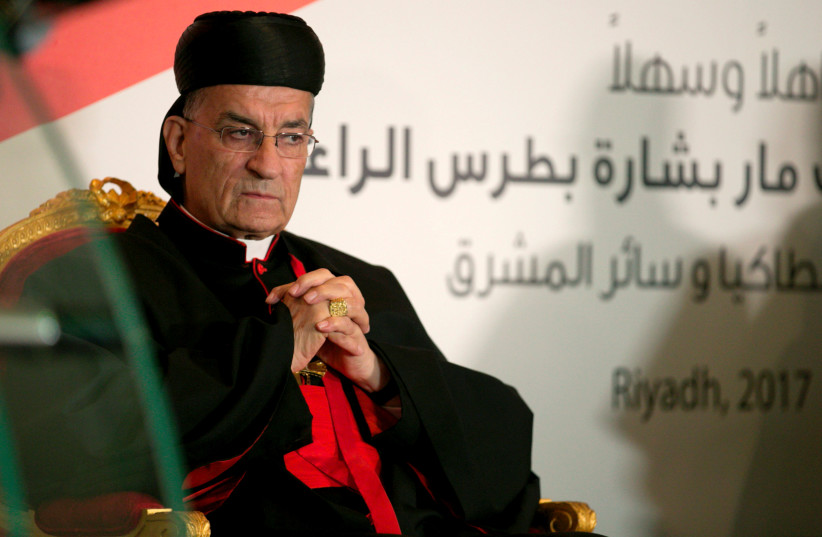Lebanon's Maronite Patriarch Bechara Boutros al-Rahi called on Saturday for the deportation and resettlement of Palestinian refugees with the help of the international community, stressing that Lebanon must consider its own national interests.
"We are with you, dear brothers, and we call on the international community to relieve Lebanon, which is exhausted economically and living difficultly, by finding a final solution to the presence of Palestinian refugees and displaced Syrians on Lebanese soil," said al-Rahi after a meeting of the Patriarchal Synod.
"The human and brotherly feelings that we have for these two brotherly peoples do not negate the nationalist thinking in the interest of Lebanon," added the patriarch. "It cannot be accepted that many parties, especially at the international level, consider refugees and displaced persons as a reality that must be adapted to the point of integration, settlement and naturalization."
<span style="background-color: #fbeeb8;"><br></span>"Final solution"
"How can these countries claim their concern for Lebanon's independence and stability, and work to undermine its unity?" questioned al-Rahi, stressing that accepting the presence of refugees as a fait accompli undermines Lebanon's unity and must be confronted.
The patriarch called for the Lebanese government to hold talks on the matter with the Palestinian Authority, Arab League, United Nations and other major countries on resettling the refugees to countries that are "capable of accommodating them demographically and ensuring a dignified human and social life for them."

Referring to the Palestinian demand for a "right of return" to the area once under the British Mandate of Palestine, Al-Rahi stated that "everyone" has disavowed the "right of return," adding "Israel not only rejects the return of the refugees but daily displaces the Palestinians residing in the West Bank and Gaza Strip."
"The people of Palestine were not created to live in a camp."
Lebanons Maronite Patriarch Bechara Boutros al-Rahi
"The people of Palestine were not created to live in a camp, but rather in a society that provides them with housing, education, work and well-being," said al-Rahi, adding that "the entity of Lebanon was not established to be the land of settlement for the peoples of the region."
The patriarch also called for displaced Syrians in Lebanon to return to Syria. On Sunday, Caretaker Prime Minister Najib Mikati also called for the international community to work with Lebanon to return Syrian refugees, warning that otherwise, "Lebanon will have a situation that is not desirable for Western countries, which is to work to get the Syrians out of Lebanon by legal means, by strictly applying Lebanese laws."
Hamas outraged
The Hamas movement expressed outrage at al-Rahi's statements on Monday, saying the movement considers that his statements "do not reflect the depth of the strong relationship that brings together the Lebanese and Palestinian national and popular political forces."
"We commend and cherish all the official and popular Lebanese stances that reject all Zionist projects and plots targeting the Lebanese and Palestinian arenas, and we reiterate that the Palestinian refugees in Lebanon are guests in this country, who demand their natural right to live in freedom and dignity, in accordance with international conventions, and they reject all projects of deportation and resettlement, and they always look forward to returning to their cities and villages, from which they were displaced by the Zionist occupation," said Hamas.
Plight of Palestinian refugees in Lebanon
About 180,000 Palestinian refugees live in Lebanon, according to the United Nations Relief and Works Agency for Palestine Refugees (UNRWA). Palestinian refugees in Lebanon suffer from widespread poverty and strict laws restricting their access to employment and social services. They cannot obtain citizenship.
Palestinian refugees in Lebanon find it extremely difficult to obtain annual work permits that they are required to obtain and often work for lower pay than their Lebanese colleagues. As the economic crisis in Lebanon continues to worsen, UNRWA recorded a significant increase in arbitrary dismissals and the absence of end-of-service compensation as many employers do not adhere to the labor rights of Palestinian refugees, according to a brief published in September 2020.
In February, Lebanon's State Shura Council decide to reverse an order issued in December allowing Palestinian refugees to work in trade-union regulated professions, after complaints by the Maronite League that the order would encroach on the rights of Lebanese professionals and claims that the order was trying to pave the way for naturalizing Palestinian refugees.
While Palestinian refugees have to pay into the National Social Security Fund, they are largely unable to access the benefits of the fund offered to Lebanese citizens.
Nearly half of all Palestinian refugees in Lebanon live in overcrowded, unsanitary refugee camps. The camps are also plagued by crime and violence, with limited enforcement by Lebanese authorities. Palestinian refugees are prevented from legally acquiring real estate in Lebanon.
